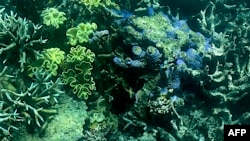The United Nations Educational, Scientific and Cultural Organization, or UNESCO, said Tuesday that "a rapid escalation of corrective measures" is needed to safeguard the future of the country's Great Barrier Reef.
UNESCO accused Australia of failing to adequately address climate change and other key threats, including poor water quality and over-fishing. The report was initially scheduled for release ahead of a UNESCO world heritage committee's meeting in June in Russia but due to Moscow's invasion of Ukraine, the meeting has been rescheduled without a specific date.
In response to the warning, Australian authorities say they are heeding the report's call for "ambitious, rapid and sustained" action to protect the reef.
For the first time, Australia has a legislated target to cut greenhouse gas output.
In August, new laws were passed by the federal parliament in Canberra that will cut carbon emissions by 43% by 2030.
Tanya Plibersek, Australia's minister for the Environment and Water, told reporters in Canberra on Tuesday that the government has been taking decisive action since winning an election in May.
"In every way you see that the Australian government has higher ambition when it comes to tackling climate change," Plibersek said. "But the point is this report was written at a time before the government was taking the threats to the reef seriously. Everything has changed."
Conservationists, however, have insisted that UNESCO's report has highlighted the danger the reef is in.
Marine surveys have shown that some parts of the Great Barrier Reef are flourishing. Others, though, are under siege from warmer ocean temperatures and more intense tropical storms, as well as coral-eating crown-of-thorns starfish.
Warmer seas cause bleaching, forcing the coral to expel microscopic symbiotic algae that gives it most of its energy and color.
Reefs can recover from bleaching, but it can take years, and there have been several mass bleaching events in recent years.
The Great Barrier Reef runs 2,300 kilometers down Australia's northeastern coast and spans an area about the size of Japan.
The recommendation for the reef to be listed as "in danger" will be considered by the U.N.'s World Heritage committee. A decision is expected next year.




